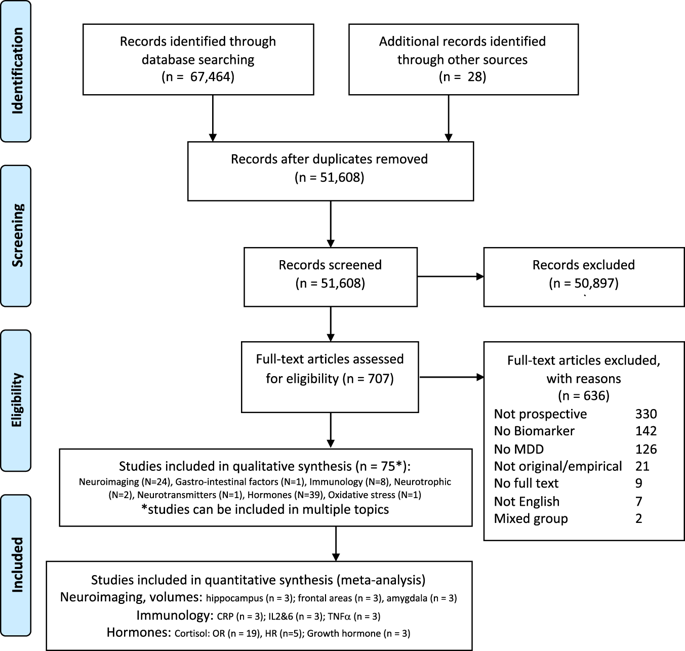当前位置:
X-MOL 学术
›
Mol. Psychiatry
›
论文详情
Our official English website, www.x-mol.net, welcomes your
feedback! (Note: you will need to create a separate account there.)
Prospective biomarkers of major depressive disorder: a systematic review and meta-analysis.
Molecular Psychiatry ( IF 9.6 ) Pub Date : 2019-11-19 , DOI: 10.1038/s41380-019-0585-z Mitzy Kennis 1 , Lotte Gerritsen 1 , Marije van Dalen 1 , Alishia Williams 1, 2 , Pim Cuijpers 3 , Claudi Bockting 4, 5
Molecular Psychiatry ( IF 9.6 ) Pub Date : 2019-11-19 , DOI: 10.1038/s41380-019-0585-z Mitzy Kennis 1 , Lotte Gerritsen 1 , Marije van Dalen 1 , Alishia Williams 1, 2 , Pim Cuijpers 3 , Claudi Bockting 4, 5
Affiliation

|
Leading biological hypotheses propose that biological changes may underlie major depressive disorder onset and relapse/recurrence. Here, we investigate if there is prospective evidence for biomarkers derived from leading theories. We focus on neuroimaging, gastrointestinal factors, immunology, neurotrophic factors, neurotransmitters, hormones, and oxidative stress. Searches were performed in Pubmed, Embase and PsychInfo for articles published up to 06/2019. References and citations of included articles were screened to identify additional articles. Inclusion criteria were having an MDD diagnosis as outcome, a biomarker as predictor, and prospective design search terms were formulated accordingly. PRISMA guidelines were applied. Meta-analyses were performed using a random effect model when three or more comparable studies were identified, using a random effect model. Our search resulted in 67,464 articles, of which 75 prospective articles were identified on: Neuroimaging (N = 24), Gastrointestinal factors (N = 1), Immunology (N = 8), Neurotrophic (N = 2), Neurotransmitters (N = 1), Hormones (N = 39), Oxidative stress (N = 1). Meta-analyses on brain volumes and immunology markers were not significant. Only cortisol (N = 19, OR = 1.294, p = 0.024) showed a predictive effect on onset/relapse/recurrence of MDD, but not on time until MDD onset/relapse/recurrence. However, this effect disappeared when studies including participants with a baseline clinical diagnosis were removed from the analyses. Other studies were too heterogeneous to compare. Thus, there is a lack of evidence for leading biological theories for onset and maintenance of depression. Only cortisol was identified as potential predictor for MDD, but results are influenced by the disease state. High-quality (prospective) studies on MDD are needed to disentangle the etiology and maintenance of MDD.
中文翻译:

重度抑郁症的前瞻性生物标志物:系统评价和荟萃分析。
领先的生物学假设提出生物学变化可能是重度抑郁症发作和复发/复发的基础。在这里,我们调查是否存在来自领先理论的生物标志物的前瞻性证据。我们专注于神经成像,胃肠道因素,免疫学,神经营养因子,神经递质,激素和氧化应激。搜索在Pubmed,Embase和PsychInfo中进行,直至2019年6月发布的文章。筛选包括文章的参考文献和引文,以识别其他文章。纳入标准以MDD诊断为结果,以生物标志物作为预测指标,并据此制定前瞻性设计检索词。应用了PRISMA指南。当确定了三个或更多可比较的研究时,使用随机效应模型进行荟萃分析,使用随机效应模型。我们的搜索结果是67,464篇文章,其中有75篇前瞻性文章被确定为:神经影像学(N = 24),胃肠道因素(N = 1),免疫学(N = 8),神经营养(N = 2),神经递质(N = 1) ),激素(N = 39),氧化应激(N = 1)。对脑容量和免疫学标记的荟萃分析不显着。只有皮质醇(N = 19,OR = 1.294,p = 0.024)显示出对MDD发作/复发/复发的预测效果,但对MDD发作/复发/复发没有及时的影响。但是,当从分析中删除包括基线临床诊断的参与者在内的研究时,这种影响就消失了。其他研究太异类了,无法比较。因此,缺乏用于抑郁症的发作和维持的领先生物学理论的证据。仅皮质醇被确定为MDD的潜在预测因子,但结果受疾病状态影响。需要对MDD进行高质量(前瞻性)研究,以弄清MDD的病因和维持情况。
更新日期:2019-11-20
中文翻译:

重度抑郁症的前瞻性生物标志物:系统评价和荟萃分析。
领先的生物学假设提出生物学变化可能是重度抑郁症发作和复发/复发的基础。在这里,我们调查是否存在来自领先理论的生物标志物的前瞻性证据。我们专注于神经成像,胃肠道因素,免疫学,神经营养因子,神经递质,激素和氧化应激。搜索在Pubmed,Embase和PsychInfo中进行,直至2019年6月发布的文章。筛选包括文章的参考文献和引文,以识别其他文章。纳入标准以MDD诊断为结果,以生物标志物作为预测指标,并据此制定前瞻性设计检索词。应用了PRISMA指南。当确定了三个或更多可比较的研究时,使用随机效应模型进行荟萃分析,使用随机效应模型。我们的搜索结果是67,464篇文章,其中有75篇前瞻性文章被确定为:神经影像学(N = 24),胃肠道因素(N = 1),免疫学(N = 8),神经营养(N = 2),神经递质(N = 1) ),激素(N = 39),氧化应激(N = 1)。对脑容量和免疫学标记的荟萃分析不显着。只有皮质醇(N = 19,OR = 1.294,p = 0.024)显示出对MDD发作/复发/复发的预测效果,但对MDD发作/复发/复发没有及时的影响。但是,当从分析中删除包括基线临床诊断的参与者在内的研究时,这种影响就消失了。其他研究太异类了,无法比较。因此,缺乏用于抑郁症的发作和维持的领先生物学理论的证据。仅皮质醇被确定为MDD的潜在预测因子,但结果受疾病状态影响。需要对MDD进行高质量(前瞻性)研究,以弄清MDD的病因和维持情况。











































 京公网安备 11010802027423号
京公网安备 11010802027423号